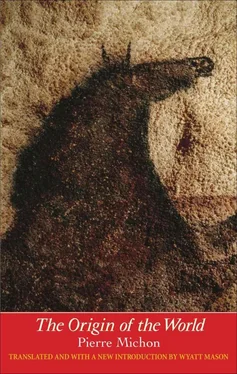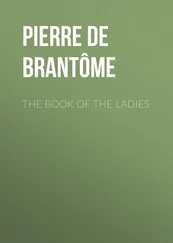Pierre Michon - The Origin of the World
Здесь есть возможность читать онлайн «Pierre Michon - The Origin of the World» весь текст электронной книги совершенно бесплатно (целиком полную версию без сокращений). В некоторых случаях можно слушать аудио, скачать через торрент в формате fb2 и присутствует краткое содержание. Год выпуска: 2013, Издательство: Yale University Press, Жанр: Современная проза, на английском языке. Описание произведения, (предисловие) а так же отзывы посетителей доступны на портале библиотеки ЛибКат.
- Название:The Origin of the World
- Автор:
- Издательство:Yale University Press
- Жанр:
- Год:2013
- ISBN:нет данных
- Рейтинг книги:3 / 5. Голосов: 1
-
Избранное:Добавить в избранное
- Отзывы:
-
Ваша оценка:
- 60
- 1
- 2
- 3
- 4
- 5
The Origin of the World: краткое содержание, описание и аннотация
Предлагаем к чтению аннотацию, описание, краткое содержание или предисловие (зависит от того, что написал сам автор книги «The Origin of the World»). Если вы не нашли необходимую информацию о книге — напишите в комментариях, мы постараемся отыскать её.
The Origin of the World — читать онлайн бесплатно полную книгу (весь текст) целиком
Ниже представлен текст книги, разбитый по страницам. Система сохранения места последней прочитанной страницы, позволяет с удобством читать онлайн бесплатно книгу «The Origin of the World», без необходимости каждый раз заново искать на чём Вы остановились. Поставьте закладку, и сможете в любой момент перейти на страницу, на которой закончили чтение.
Интервал:
Закладка:
And once again she was the woman who sold Marlboros to the young instructor and made the best of things in Castelnau. She existed. The callipygian Venus was only a woman. She turned away as one does when one is about to cry and without a word left me there in the field and moved toward the village where she would sell tags, one of her own on her cheek. She had another one on the fat of her calf; it looked astonishing beneath the black nylon. She walked slowly, immoderately. She swayed as she walked. The little hoods were disappearing beneath the walnuts. At their shoulders in the shadows, the emblematic animal — the coyote or the dingo, the fox, the cunning trickster of old cosmogonies, red and sly, the fabulist’s flatterer — had long since been invisible, and was doubtless swaying too. Night was falling, the sharpening stars pinned themselves on high. The hatchets struck dully at my back, echoing around me. A tree collapsed in a crash of barn doors opened and closed by the wind. Lights came on in Castelnau. Still along the great night a pure white hand held out in the west. The queen was at the bottom of the field, high-heeled like a crane, naked beneath her furbelows, like a scaled fish. Her hips were moving. I thought about what had made them move even more a little while ago. I thought about her vivacity, her cruel elegance; the arrogance of beauty; the shame that crushed her high-pitched voice; the sound of her cry. I tried to imagine her as Bernard’s mother. The dry bulrushes caressed her ankles, ran her stockings, cut. I felt this in my stomach. Beneath the shadows, beneath the coat, beneath the skirt, beneath the nylons, the earrings, the pearls and the Sunday best, beneath Milady’s braids and gathers, hugging the dark stockings, lay this dazzling daylit flesh where at its whitest I imagined, twenty times over, beaten, received during intense thrusts and punctuated by sobs, the heavy, unanswerable phrase that remained forever redundant, forever jubilant, suffocating, black, the absolute authorship she wore on her face.
Four
That nightI learned of an old custom, surely long since abandoned, that held if a hunter were to kill a fox, he should entrust the pelt to innocents, so they might walk from village to village and rejoice in the ostentatious defeat of this pest while earning some coin off its skin: the animal, they said, carries rabies. Long ago it was said that it stole eels, hunted down she-wolves, and devastated vineyards. I always relate it to Yvonne’s defeated and devastated flesh, to her soul that had been flayed one deep cold night.
I should mention that I had a girlfriend in Périgueux. She was a student there and came to visit me in her little old Renault, often on the spur of the moment as her schedule allowed. She adored Hélène and I think the feeling was shared: sometime they would spend all day in the kitchen of the auberge while I was at school, or at a table in the main room where Madelaine, or Mado — that was what I called her — drank from the same cup of coffee that had long turned cold, and during the course of her daydream made circles with her cup on the polished wood, bringing Hélène’s wrath down upon her. They talked and exchanged recipes for jam, passed photos, and showed off pieces of their wardrobe; Mado complaisantly sang the praises of her stockings and then displayed them; occasionally, she looked upset when I returned from class, the old woman was dreamily easygoing, perhaps more elegantly so than usual, her gray forelock tucked under her scarf; they had talked about men, about what made Jean the Fisherman hunt for eels, about the late innkeeper who was as good as any other when she’d had something under those pretty old clothes and he’d had hands to remove them, about me, always evasive, touching her lightly, almost caressing, but pushing away at every turn, toward the Beune below, toward the fox above, the fiery weight that crushed us, me, the innkeeper, Jean, and the others. These back-kitchen councils gave me a feeling men have from time to time: irritation mixed with a vague fatuity prompted by the sudden certainty that knives were being sharpened in preparation for one’s return. They smiled at me, made me coffee, cut me big slices of cake. All of this was too clear; I took refuge in some corner with my papers to grade, while I listened to this complicated jumble coming from my Wallachian drinkers darkening into their beers, seeing something in the black and trying hard to talk about it, the ghost of Jean the Fisherman scrutinizing the deep black outdoors, poaching, looking for meaning in every puddle of the great bayou where we were. I waited for all this to end, these stories of nets and stockings: the council eventually tired of brushing gently against the unspeakable; Mado suddenly noticed I was there; we left. We took the old Renault, stopping along a sunken lane, and I seized her roughly across the stick shift, in this little toy car that in this instance seemed more like a prison. She was more turned on by her conversations with Hélène than by my maneuvers: I didn’t say a word, did her with my eyes closed, without preamble, giving everything to Yvonne, into her smooth hand that bore my cigarettes, onto the distant gathers of her Sunday best, all along the black gash a scarf had hidden for a fortnight. Mado was easy, she made the best of it, as most do, I suppose. She was a brunette too, thinner, Mediterranean, as they say. In the Renault, she made little cries like a mouse, as when one enjoys a meal. The excessive preparations and the total defeat, the leaps and the tears, the great hatchet at the tiny conjunction of two sexes, love, in a word, wasn’t her thing. I should say that I wasn’t of very much help, I had this elsewhere: on the square hung a consecrated blade.
We would take walks, visit the surrounding area, from Font-de-Gaume to Lascaux, from La Ferrassie to Sous-Grand-Lac. Yes, of course: beneath these places run rivers, cutting holes through the limestone. Above these holes, reindeer made for summer pastures endlessly, climbing from the Atlantic in spring to the green grass of l’Auvergne surrounded by their thundering hooves, an immense dust cloud on the horizon, their antlers above, and the doleful head of one pushing into the rump of the next; and there, in the dissolute gully that cradles and nurses the Vézère, the two Beunes, and the Auvézère, we waited for them with Dabs, Parrot’s Beaks , and cries; and the lichen eaters heard the drums in the distance, saw the fires as if night and day were watching the smoke, but made for the drums without deviation, stretching out in the narrows beside the water, trembling; they plowed straight ahead; because if the reindeer had been able to conceive of a god or a devil, they would have prayed and pondered, then and there, seasonal and unstoppable, each April burgeoning suddenly everywhere like the horns piercing their brows, unleashed without reason like gods, manifesting in a single body endlessly multiplied and animated by a single will that drives them mad, in noisy hordes, men carrying hatchets, graves filled with pikes; and they would have thought that this god was clement, because after all only a part of them was truly present, and remained there all summer enjoying the golden lichens on the basalt, the sun that sets behind the gently sloping round volcanoes when the weather is beautiful and the day is spent ruminating grass. And the men who were the gods of these reindeer, after eight days of charivari, of blood, of live forces in the narrows, skinning, salting, din, these early days of April that allow them to do nothing for the rest of the year, to watch, to talk, filling their bellies, enjoying their wives and loving the little babies that spring forth, these men, and it seems that it’s true since the carbon 14 dated it all conclusively as if decreed by some socialist savant, when they’d had enough of their children and their women, of the interminable discussions in a blood red hut with their great hats rung with antlers and feathers, men descended into the caves and made paintings. Not all the men: only those with more delicate hands, a more ready or tortuous spirit, single hearts that went at night to look for meaning in the puddles of the Beune, and not finding it there gathered at a place of opaque stones that have meaning, words and combinations of stones and words that make sense, and out of these combinations, strength; those who wished to expiate the blood of the deer, but not for the beautiful eyes of the deer, rather, to be free of every care and to kill better the next year and without remorse, with a hand that nothing would still; those who were afraid of the dead spoke to them better than anyone, with a little paper or not, a tricolor scarf or not; those to whom the mayor of some little spot in the Dordogne, perhaps Eyzies, speaks without knowing it, that in his kiss he joins and welcomes beneath the eyes of the citizens whose hats are in their hands, on the eleventh of November, with his crib before a monument to the dead. The mayor of Les Eyzies perhaps thinks of them during the ringing of the bells for the dead. And it once was not uncommon to take these few to be shamans, to be as knowledgeable as socialist savants and as pious as Mohicans, calling forth wild game and rain while drawing them in the dark, then dancing before this imposing display where great cows jump, or one lone wolf runs; and it is now not uncommon to see these men as artists, as art has become fashionable; the times have tossed the socialist savants and their gesticulating primates to the nettles, as if that were so different, as if the arts too didn’t dance in front of the display and shake its doors open to share in its marvels. But upon reflection these were indeed artists, since they made this hole off-limits to others, where they came and entered gingerly and with an air of great mystery, antlers on their heads while they muttered paternosters, and also because they doubtless wrote Oedipus Rex and Theogony on those walls in a writing made of animals that we can’t read. So I distracted myself there from Yvonne, or perhaps went to see her by taking a detour, the long road, as the old bachelors had: we visited these caves behind their hallways, their ticket windows, their uniformed employees, Mado and I; and a hundred times between two submerged lanes between Les Eyzies and Montignac, I repeated this Paleolithic lecture to myself and I repeated it to her.
Читать дальшеИнтервал:
Закладка:
Похожие книги на «The Origin of the World»
Представляем Вашему вниманию похожие книги на «The Origin of the World» списком для выбора. Мы отобрали схожую по названию и смыслу литературу в надежде предоставить читателям больше вариантов отыскать новые, интересные, ещё непрочитанные произведения.
Обсуждение, отзывы о книге «The Origin of the World» и просто собственные мнения читателей. Оставьте ваши комментарии, напишите, что Вы думаете о произведении, его смысле или главных героях. Укажите что конкретно понравилось, а что нет, и почему Вы так считаете.












